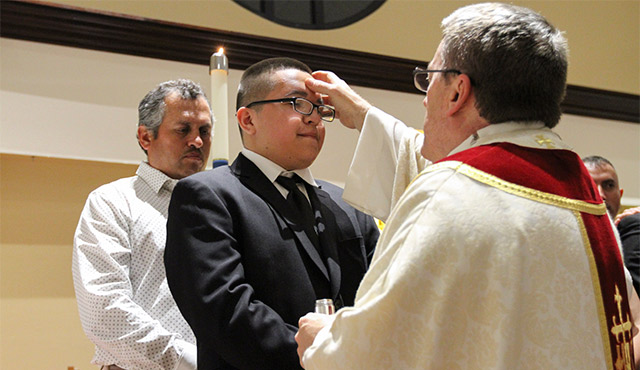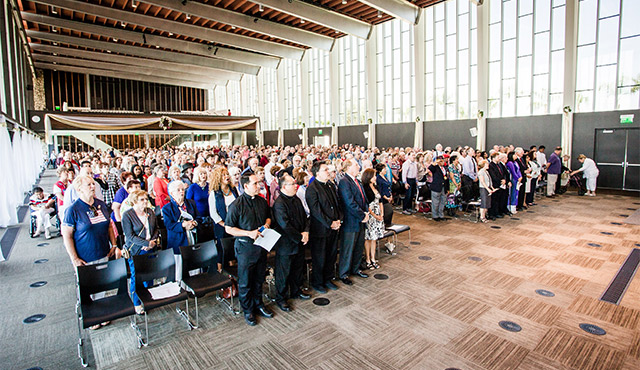A YouTube video about the love of Jesus inspired 16-year-old Cassidy Wendell to delve into the Catholic faith and make it her own. She was not baptized, but attending JSerra Catholic High School in San Juan Capistrano, so she asked her religion teacher and the campus ministry for guidance.
The route “was very easy and I am thankful,” says Wendell, who was among almost 2,000 people age 7 and older who were brought into the Catholic church by receiving the Sacraments of initiation – baptism, confirmation and the Eucharist – at parishes across Orange County during this year’s Easter season.
Each newly minted Catholic has a personal story of conversion by the Holy Spirit, often working through the loving outreach of a Catholic friend or the jolting revelation of a life crisis. Some are attracted by the peace they feel inside a church or by the liturgy of the Mass. For others baptism is the finish line of a slow crawl toward the Catholic Church fostered by years of scholarly reading and prayer.
Thomas Reynolds, a 24-year-old analyst with a merger and acquisitions firm in Orange, was not baptized as a youth when he worshiped at a nondenominational Christian church. He gravitated to Catholicism after his faith in Christ was challenged in college. That’s when he says he researched the roots of Christianity and decided the practices of the Catholic Church most resembled those of the founding apostles. In Reynolds’ way of thinking, he did his ‘due diligence.’
“The reality of it is the stirring that happens within people. God implants the desire to know Him,” says Lesa Truxaw, director of the Office for Worship in the Diocese of Orange, which oversees the Rite of Christian Initiation of Adults.
A person can begin seeking information about the Catholic faith by talking to an admired Catholic friend or relative. “A great question to the Catholic is, ‘Why are you Catholic and what do you value about the Catholic Church?’” Truxaw says.
Catholics who give testimony should respect the seeker and never give the impression that prior faith experience lacks value. Truxaw says she has too often heard from seekers that they were treated “as if their prior faith was of no consequence. That is a great put-off.”
The other problem that seekers mention is that the institutional church has too many hoops to jump through. “Having a friendship with someone who is Catholic can make some of those hoops a little less formidable,” Truxaw says.
Those considering joining the Catholic Church also can talk to a parish pastor, deacon or other church staff member. Ultimately they will be directed to the person in charge of the Rite of Christian Initiation of Adults (RCIA), modeled on the faith formation process that was popular in the early Church and revived by the Second Vatican Council.
Since 1988 every Catholic diocese in the United States has been required to provide parish-based RCIA programs that take under their wing those seeking knowledge about the Catholic Church, and who are put on a path toward receiving the Sacraments and participating in the church community, if that is what they decide they want.
“A parish needs to be open for inquirers at any time,” says Truxaw. Inquirers range from the unbaptized with little understanding of Christianity, to those baptized in the Catholic Church who never practiced their faith, to prayerful, baptized members of other Christian denominations who are thoroughly acquainted with Christ and the Scripture and have an active faith life. The RCIA coordinator makes certain the preparation each person receives matches his or her needs.
Those who have never been baptized and choose the path to become Catholics are called catechumens, while those who were baptized in another Christian religion or baptized Catholic as infants but never formed their faith and now want the other Catholic sacraments are called candidates.
“The brilliance of RCIA is that it meets people where they are and walks with them in their spiritual path,” Truxaw says. The year-long program is never coercive; people who come to learn about the Catholic religion can drop out of the program whenever they like.
One recent Sunday afternoon Eileen Smith, who runs the RCIA program at Mission Basilica San Juan Capistrano, and her husband Pete sat at a round table with a handful of people who had embarked on the initial stage of the RCIA program. They included two young women who were sisters. One as an infant had been taken by her grandmother to be baptized. She says she talks to God all the time and never feels alone. Her younger sister who was unbaptized had read about the RCIA on the parish website and together they had come to learn more about their grandmother’s faith.
An older married couple says they drove from San Diego County because they fell in love with the basilica church. “It moved me a lot,” says the wife, who is unbaptized and urged her husband, a non-practicing Catholic, to join her at the inquiry session.
“God has big plans for you. You are here,” says Smith in welcoming the group.
Earlier, the Smiths met with the newest RCIA graduates who participated in a full Church liturgical year of Sunday Masses and holidays, Scripture reading and prayer, and Christian service to others, during which they were each paired with a sponsor. On Easter Vigil this year the unbaptized were baptized and all received First Communion and Confirmation.
The new Catholics continued to meet weekly during the 50 days of Easter to reflect on the Sacraments they received, consider how to use their talents to express Christ’s love in the community and to prepare for the Sacrament of Reconciliation.
Reynolds, who was part of that group, says after years of working out his beliefs on his own through study, he appreciates talking about his faith with others. He has become friends with his sponsor, who is now his godfather. He says his mother, whom he described as “spiritual” but not belonging to a specific religion, traveled from Northern California for his baptism. He says he also discovered to his surprise that his father, a fallen-away Mormon, was not angered by his conversion and is willing to talk about Catholicism, including aspects of the Church with which he disagrees.
Reynolds says his father once had worried that his son was joining the Catholic Church because his fiancé was Catholic. But Reynolds says he and his fiancé had since broken up and he still yearned for the faith. “This is all about me,” he says.


